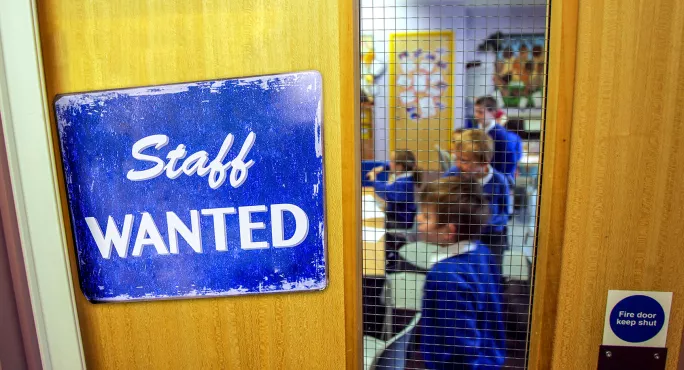Teacher shortages: DfE considers review of profession

The new government is looking at proposals to launch a fresh review of the teaching profession to address standards and pay, Tes has learned.
The review would likely look at the support that schools and trusts provide for their employees, including flexible working and pay and conditions, if it gets the green light from ministers, according to details seen by Tes.
The Department for Education is currently seeking advice on what a review of the teaching profession might look like and drawing up proposed terms of reference, Tes has learned.
The move comes after the newly elected Labour government inherited a spiralling teacher recruitment and retention crisis.
While Labour has pledged to hire 6,500 new teachers, the sector is still waiting for more details on how it plans to achieve this goal.
A review of teacher standards?
The DfE will consider including teacher standards and pathways through a teacher’s career in the review, Tes understands.
The review could also consider professional development and how the DfE could deliver a related entitlement.
In its manifesto, Labour said it would introduce a new teacher training entitlement “to ensure that teachers stay up to date on best practice with continuing professional development”.
Another area that the review could consider is accountability through employers, professional bodies and regulators, following Labour’s pledge to remove one-word Ofsted inspection judgements and replace them with report cards.
Tes revealed last year that the DfE was refreshing its 2019 recruitment and retention strategy, first published under the former education secretary Damian Hinds.
- Teacher recruitment: DfE workforce strategy delayed amid “uncertainty”
- Labour’s education policy: What schools can expect
- Workforce: DfE set to refresh teacher recruitment strategy amid crisis
But this strategy refresh was beset by delays amid “uncertainty” about future planning and the prime minister’s plan for the Advanced British Standard qualification.
The DfE was also drawing up recommendations for cutting teacher workload before the general election was called.
Education secretary Bridget Phillipson said last week that while the previous government had done some work on workload, she wanted to “look afresh” at the problem.
Data published by the DfE this week revealed that the proportion of teacher trainees who dropped out or did not achieve qualified teacher status (QTS) increased to 8 per cent last year, the highest rate in six years.
Ms Phillipson told the House of Commons yesterday that she is “working tirelessly” to tackle high teacher attrition rates.
“Teachers are leaving the classroom, not in dribs and drabs but in their droves. And I know that too often opportunity follows them out the door,” she said.
Pepe Di’Iasio, general secretary of the Association of School and College Leaders, said it was right for the government to put together a “comprehensive plan”, given the scale of the recruitment and retention problems.
“The new government’s ambition of recruiting 6,500 more teachers is a good start but can only be met or surpassed by pulling together a range of strategies from across the education system,” he said.
Paul Whiteman, general secretary of the NAHT school leaders’ union, said it was important to ensure that teaching is “a highly attractive proposition for graduates”.
He added: “The figures from recent years make it very clear that not only do we need to attract more people into teaching, but we also need to do much more to keep those we already have in the profession.”
Mr Whiteman said that pay was “undoubtedly a part of the solution” but added that workload, professional development, career pathways and professional agency also needed to be considered.
Daniel Kebede, general secretary of the NEU teaching union, said the possibility of a review was “really welcome news”, adding that he hopes the proposal “comes to fruition”.
“The recruitment and retention crisis is deep and severe,” he said. “There has been a decades-long erosion of the [teaching] profession. We need the secretary of state to establish an independent review into the profession, in the spirit of Houghton of 1974.”
The Houghton commission was the first independent review of teachers’ pay in Great Britain.
“We want to work with the government to correct the crisis in recruitment and retention over the course of a Parliament in which pay must go up, workload must go down and the profession must be valued,” Mr Kebede added.
The DfE has been approached for comment.
For the latest education news and analysis delivered directly to your inbox every weekday morning, sign up to the Tes Daily newsletter
You need a Tes subscription to read this article
Subscribe now to read this article and get other subscriber-only content:
- Unlimited access to all Tes magazine content
- Exclusive subscriber-only stories
- Award-winning email newsletters
Already a subscriber? Log in
You need a subscription to read this article
Subscribe now to read this article and get other subscriber-only content, including:
- Unlimited access to all Tes magazine content
- Exclusive subscriber-only stories
- Award-winning email newsletters
topics in this article



